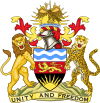Communications in Malawi includes the country's postal, telephone, television, radio and internet services.
The media of Romania refers to mass media outlets based in Romania. Television, magazines, and newspapers are all operated by both state-owned and for-profit corporations which depend on advertising, subscription, and other sales-related revenues. The Constitution of Romania guarantees freedom of speech. As a country in transition, the Romanian media system is under transformation.
Music of Malawi has historically been influenced through its triple cultural heritage of British, African, and American music. Malawians have long been travelers and migrant workers, and as a result, their music has spread across the African continent and blended with other music forms. One of the prime historical causes of the Malawian musical melting pot was World War II, when soldiers both brought music to distant lands and also brought them back. By the end of the war, guitar and banjo duos were the most popular type of dance bands. Both instruments were imported. Malawians working in the mines in South Africa and Mozambique also led to fusion and blending in music styles, giving rise to music styles like Kwela.
The South Korean media consist of several different types of public communication of news: television, radio, cinema, newspapers, magazines, and Internet-based websites.

The media of Indonesia consist of several different types of communications media: television, radio, cinema, newspapers, magazines, and Internet-based Web sites.

The media of Israel refers to print, broadcast and online media available in the State of Israel. The country boasts dozens of newspapers, magazines, and radio stations, which play an important role by the press in political, social and cultural life and cater it to a modern, developed and literate society.
The media of Russia refers to mass media outlets based in the Russian Federation. The media of Russia is diverse, with a wide range of broadcast and print outlets available to the consumers. Television, magazines, and newspapers are all operated by both state-owned and for-profit corporations which depend on advertising, subscription, and other sales-related revenues. The Constitution of Russia guarantees freedom of speech. As a country in transition, Russia's media system is under transformation.
The media of Afghanistan includes printing, broadcasting, and digital. It is mainly in Dari and Pashto, the official languages of the nation. According to the Attorney General's Office of Afghanistan, "there are 1,879 active media outlets in Afghanistan which are called as one of the main achievements of the country in the past 18 years."
Nyasa Times is an online newspaper providing Malawian news, founded by Edgar Chibaka, who remains its Managing Editor, assisted by Thom Chiumia. It began reporting in late 2006. According to its own website, it received "over 8 million hits per month" in 2010. The publication has on numerous occasion been at loggerheads with the Bingu wa Mutharika government. Mutharika accused former president Bakili Muluzi of bankrolling the online media outfit to publish false stories to tarnish the image of the government. Muluzi denied the accusations.
The 2012 Malawian constitutional crisis occurred from April 5, 2012 - April 7, 2012 after senior members of the Democratic Progressive Party-led cabinet failed to notify the public of the death of the sitting president, Bingu wa Mutharika on April 5. Instead, cabinet ministers held a series of meetings in Lilongwe, Malawi without vice-president Joyce Banda with the aim of undermining the constitution and Banda's succession to Presidency. News confirming his death had, however, quickly spread across the country through word of mouth, cellphone text messages, Malawian bloggers, Twitter, Facebook, and on listservs by the end of the day on April 5, 2012. Therefore, the failure to announce his death resulted in speculation over the real health of the president and over whether the succession procedures would be followed as outlined in the constitution. According to the constitution, the vice-president takes over but there had been no official word on a successor or communication with the vice-president. Amidst growing speculation, the Cabinet announced that the president's brother, Peter Mutharika, the foreign minister, was the new President of the party on April 6. The Cabinet only announced his death two days after his death, after which Banda became Malawi's first female President.
Agnes Penemulungu is a Member of Parliament for Lilongwe South in Malawi. She was elected on President Mutharika's Democratic Progressive Party ticket.
Vitus-Gregory Gondwe is a Malawian journalist, editor and media consultant. He also runs his own social, music and business analysis blog. He is known for his investigative stories. He also writes on Business news. He has been a contributor to several newspapers in Malawi, and has worked for the Malawi Broadcasting Corporation as correspondent. He is a Malawi correspondent for the Associated Press, as well as a regular correspondent for BizCommunity and BiztechAfrica. He has contributed to a number of news sources worldwide since 1993. He also regularly writes about freedom of Press and the media industry.
Zodiak Broadcasting Station is a privately owned radio station in Malawi. It was founded in 2005 by Gospel Kazako. The station has more than 25 transmitting sites and reaches the whole of Malawi. Nearly 75% of its programmes are broadcast in Chichewa, Malawi's main language. One of its most popular shows is its Chichewa talk show 'Tiuzeni Zoona'.

Malawian Airlines Limited is the flag carrier airline of Malawi, based in Lilongwe and with its hub at Lilongwe International Airport. It was established in 2012 after the liquidation of Air Malawi, the former national airline. Ethiopian Airlines operates it under a management contract and owns 49% of the airline after it emerged as the winner following competitive bidding.
Media in Zambia consist of several different types of communications media: television, radio, cinema, newspapers, magazines, and Internet-based Web sites. The Ministry of Information, Broadcasting Services and Tourism is in charge of the Zambian News Agency which was founded in 1969.
Gospel Kazako is a Malawian entrepreneur who in 2005 founded the Zodiak Broadcasting Station, the most popular radio station in Malawi. He is also known as a poet.
Chipiliro Gama more famously known as Shepherd Bushiri, known as Major 1 or Prophet Shepherd Bushiri, is a Christian preacher, motivational speaker, Author and businessman from Malawi. He founded and leads a Christian non-denominational evangelical church known as the Enlightened Christian Gathering. The church has headquarters in Pretoria, South Africa with branches in other African countries and around the world. Tens of thousands of people are attracted to the church every day. He describes the church as a Prophetic Ministry based on the principle that God cares and loves people and wants to speak directly to them.






